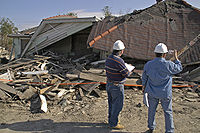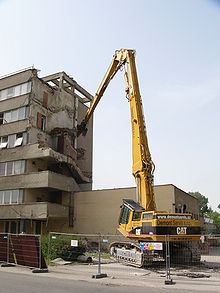Wikipedia:An unfinished house is a real problem
This is an essay. It contains the advice or opinions of one or more Wikipedia contributors. This page is not an encyclopedia article, nor is it one of Wikipedia's policies or guidelines, as it has not been thoroughly vetted by the community. Some essays represent widespread norms; others only represent minority viewpoints. |
| This page in a nutshell: An unfinished article is not a harmless thing. As such, you should make it accurate and readable before saving. |

- A man tries to build a house. He has a few of his neighbors come to help. They are working very nicely and organized-like, like you would expect from people who are trying to build a house, yet they are all amateur carpenters, masons, and architects.
- Soon, a building inspector comes by. "Those stairs don't meet the building code," the inspector says, pulling out a tape measure, "and by these measurements, they will collapse when anyone over 50 lbs. weight gets to the fourth step."
- The builder replies, "Well, that's OK, because we'll just rebuild those if you give us a little time."
- The inspector moves on. "This wall isn't supported enough," the inspector says nonchalantly. "It's load bearing, but structurally unsound."
- "Of course not," the builder replies, "We're going to put up other walls next week that will be even better! You'll see!"
- "And look!" the inspector cries, "The foundation appears not to be concrete, but gelatin mixed with kindergarten paste! The owners of this house will be angry indeed when the rains come."
- "They won't!" the builder retorts, "Because when it's done there will be a ceiling!"
- The inspector walks away, shaking his head because the builders will always have an answer. Then, when the house was finally occupied, and all the party guests arrived, they were killed when the stairs collapsed, the walls fell in, and the floor turned to water.

Wikipedia is open to be read by anyone at all times. Google Search rapidly indexes pages, and as soon as someone searches for the topic you're writing about, they will find your article. Real damage can be done if your article isn't ready for prime-time. Too many students have failed tests and assignments because of the inaccuracies of that little stub someone wrote on the topic they were researching (whether they should have been using Wikipedia is another story). This doesn't help people's perception of Wikipedia (think of all the schools and colleges that ban referencing it). Then we have the issue of people getting the wrong ideas about a living person and harming them in the process. All of this impedes our core mission: to inform people about whatever subject they want to learn about. An inaccurate reference resource helps no one do anything except perpetuate the inaccuracy.
The solution
[edit]Don't put your little substub in the mainspace until it meets the building code. In the mean time, keep it in your userspace as a subpage of your userpage (for example, put it here) until it's ready to be read. Check the zoning laws to make sure your subject even belongs here. Then when you have something useful, move it to the mainspace. It will save you a lot of headaches rather than waiting for your article to be demolished or nuked from high orbit and then having to explain everything to the city officials. In the process you let them take care of the real problems instead of having to work with you and your little building. The Empire State Building wasn't open to the public until it was finished and inspected. Remember, on Wikipedia, finishing means pressing Save and the inspectors can only demolish what's already built.
See also
[edit]- Wikipedia:Don't demolish the house while it's still being built, an opposing viewpoint
- Wikipedia:Beef up that first revision
- Wikipedia:Stub Makers
- Wikipedia:Don't hope the house will build itself
- Wikipedia:Deletion of pages under construction, a failed proposal
- Wikipedia:Why was my page deleted?
- Wikipedia:The deadline is now
- Wikipedia:Temporary versions of articles § Arguments against temporary versions
- Wikipedia:Every edit must stand on its own feet, an essay that explains how to avoid leaving the house unfinished
- Wikipedia:Pruning article revisions, an essay with alternative suggestions
